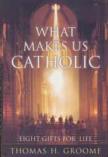Wrap the Package
What is it about this book that troubles me, with its robust Catholic cheerleading, rah-rahing us through sacraments, the life and current presence of Jesus Christ, our rich tradition? While I completely agree with what Thomas Groome is saying, am I turning into somewhat of a crabby Catholic at the many attempts to bring sheep back into the fold and to have those within appreciate what we have?
Perhaps I am just getting testy about the plethora of books that attempt to tell the world what Catholicism isand that it is, after all, a pretty good way to live a life. (Confession: I may have written one or two of these myself.) But we seem to be in a time when Catholicism needs to be sugarcoated for an easy, unsuspecting gulp. No strain, no pain, take thisit’s good for you.
Professor Groome’s italicized introduction to each chapter, giving a personal vignette to lead us gently into deeper verities stands out as an author’s (or editor’s) device to continually lure the leery. They seem to have a sort of gotcha approach to them, and the stories themselves seem added as either filler or buffer.
And then, on the dust jacket, are the proclamations that the author is the leading expert on Catholic education in the world, a well-known expert on all things Catholic, whose earlier book is widely regarded as the most important and influential contemporary work on the subject. Well. I should have sat up straighter in my chair.
This grousing on devices and puffery aside, when stripped down to its basics, Groome’s book contains a handy précis of Catholic thought and the Catholic approach to life. More importantly, when Professor Groome speaks from the heart at book’s end, we have both a clear call to what Catholicism can mean to a person’s lifeand the demands that will be made upon it.
The church has steered away, Groome rightly points out, from bringing converts in toward bringing Christians out. How well many of us remember giving our pennies and nickels in grammar school so that missionaries, with our support, might baptize those pathetic pagan babies. And how we were told that if we converted a single person to our one, true faith, our own spiritual hide would be spared the fires of hell. We were looking for notches on our heavenly belt, rather than being asked to live out our faith in the messy, chaotic, comic opera that is most of our lives.
Instead, the Second Vatican Council and those within our church who share its prophetic call bid us to go back to biblical mandates and actually live out the Gospel in our livesnot to stop with just checking off church attendance, devotional hours and fasting days, as if God were some sort of divine bookkeeper with whom we had to settle accounts.
By providing four practical spiritual practices (make friends among people who are different, promote justice and compassion for people who are far away, place no borders on your concern and prayers, and recognize faith as an ultimate mystery, being ready to say I don’t know’), Groome supplies a straightforward primer for a quite wonderful and holy Catholic life.
And as the siren song of spirituality floats across our consciousness, Groome wisely points out that while aspirations of the human spirit certainly are laudable, without God we are left with a brightly wrapped but ultimately empty package. Yes, there certainly can be spirituality without formal religious practices (and, in fact, some of our parishes are killers, not enhancers of the Spirit), but most of us need a structure and a community. Catholicism has, does and will continue to provide them.
This article also appeared in print, under the headline “Wrap the Package,” in the April 8, 2002, issue.








